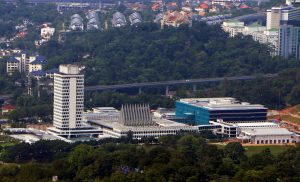Malaysia’s Prime Minister Muhyiddin Yassin has agreed to reconvene the country’s suspended parliament later this month, after weeks of intensifying pressure from the public, political opponents, and the country’s king.
In a statement yesterday, the prime minister’s office said the lower house would sit for five days between July 26 and August 2, and will be followed by a three-day Senate session starting on August 3.
The sitting of the bicameral legislature “aims to explain the national recovery plan to the MPs and amend the laws and rules necessary for a hybrid session of parliament,” the statement said. It added that “all emergency proclamations and ordinances by the king shall be laid before both houses of Parliament.”
As Alifah Zainuddin wrote in these pages yesterday, the call comes amid growing pressure from the public and the political opposition. It also follows repeated rare calls from Malaysia’s King Sultan Abdullah for the legislature to reconvene before a state of emergency expires on August 1.
Parliament has been suspended since January, when Muhyiddin obtained the king’s assent for a state of emergency to deal with COVID-19. But Muhyiddin’s rivals – including both members of the opposition Pakatan Harapan (PH) coalition, and members of his own camp – have criticized the emergency suspension of parliament as a way of shoring up his political position.
After having finagled his way into office in March of last year after helping engineer the collapse of a PH government, Muhyiddin has limped along with a slim majority in parliament, and has been forced to parry attacks from opponents and nominal allies alike.
Muhyiddin’s case has not been helped by the fact that the state of emergency has done little to prevent the spread of COVID-19. Malaysia is currently in the grip of its worst outbreak of the virus, having recorded some 785,000 positive cases, the highest per capita infection rate in Southeast Asia, and some 5,574 fatalities.
The decision marks a reversal of Muhyiddin’s previous position, which was that the legislature could only meet once the country’s daily COVID-19 caseload had dropped below 2,000, which he pegged for September at the earliest. (Daily caseloads are currently around three times that high.)
In recent weeks, however, pressure has mounted on the Malaysian leader to change his stance, with both King Sultan Abdullah and the heads of the country’s nine Malay royal households backing the opposition’s call for a sitting of parliament before the expiry of the state of emergency. At the same time, Muhyiddin has faced increasing calls from the Malaysian public over his handling of the pandemic, with hundreds posting photos of black flags on their social media profiles, alongside calls for the leader to resign.
While Muhyiddin has acceded to a sitting of parliament, it remains to be seen how substantive the sessions are. One MP pointed out that the government statement announcing the sitting had only mentioned that lawmakers would be given a “briefing,” without specifying whether they would be allowed to respond.
Whatever he decides, Muhyiddin can only hope to delay the inevitable reckoning for his government’s failure to get COVID-19 under control, despite suspending Malaysia’s democratic process in order to do so. Sooner or later, his government will have to face the judgment of the parliament – and eventually, the public.
































